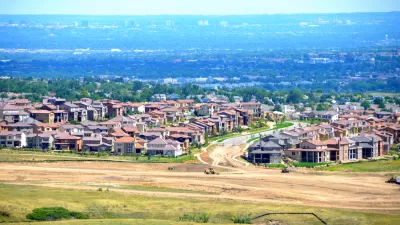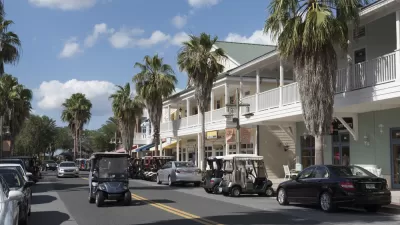Any narrative of the contemporary American residential market that neglects the continued proliferation of sprawl fails to describe the complex preferences of the public.
Environmentalists and urbanists concerned with the environmental, social, and economic impacts of sprawling have lots of reasons to be comforted by recent trends toward the city and away from post-war suburban models. According to an article by Kaid Benfield, however, the housing market is far more complex than a one-way shift toward urban living. His conclusion: "let's not pronounce sprawl dead just yet."
As for the larger implications of that conclusion, Benfield adds: "Mostly, I am struck by what seems to be a growing divide, as seems to be the case with so much of American life. Home sizes are increasing, but so are sales of micro apartments. Sprawl continues, but so does revitalization. Environmentalists should take all especially rosy – as well as all especially dire – predictions with appropriate caution."
FULL STORY: Let's Not Pronounce Sprawl Dead Just Yet

Maui's Vacation Rental Debate Turns Ugly
Verbal attacks, misinformation campaigns and fistfights plague a high-stakes debate to convert thousands of vacation rentals into long-term housing.

Planetizen Federal Action Tracker
A weekly monitor of how Trump’s orders and actions are impacting planners and planning in America.

In Urban Planning, AI Prompting Could be the New Design Thinking
Creativity has long been key to great urban design. What if we see AI as our new creative partner?

King County Supportive Housing Program Offers Hope for Unhoused Residents
The county is taking a ‘Housing First’ approach that prioritizes getting people into housing, then offering wraparound supportive services.

Researchers Use AI to Get Clearer Picture of US Housing
Analysts are using artificial intelligence to supercharge their research by allowing them to comb through data faster. Though these AI tools can be error prone, they save time and housing researchers are optimistic about the future.

Making Shared Micromobility More Inclusive
Cities and shared mobility system operators can do more to include people with disabilities in planning and operations, per a new report.
Urban Design for Planners 1: Software Tools
This six-course series explores essential urban design concepts using open source software and equips planners with the tools they need to participate fully in the urban design process.
Planning for Universal Design
Learn the tools for implementing Universal Design in planning regulations.
planning NEXT
Appalachian Highlands Housing Partners
Mpact (founded as Rail~Volution)
City of Camden Redevelopment Agency
City of Astoria
City of Portland
City of Laramie





























